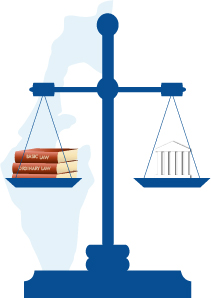SAI Independence: Examining the Root of Contradiction in Israel

by Dr. Amir Seri, Commissioner of State Audit, Service, Marketing and Regulation Group, Israel Electric Cooperation, and Lecturer at Bar Ilan University-Israel
Introduction
In a 1995 case against Israel’s State Comptroller, the Israeli Supreme Court stated in its ruling that the “Comptroller has no discretion as to whether it should commit itself to the task of preparing an opinion as required of it; it is a mandatory obligation,” and directed the Comptroller to render an opinion on the required subjects.
Nearly a quarter of a century later, the Comptroller’s office, the nation’s Supreme Audit Institution (SAI), once again faced similar allegations. Two articles published in a December 2018 Israeli newspaper cited Comptroller misconduct by failing to issue 40 percent of the opinions requested—in purported violation of Israeli law and contrary to the Supreme Court’s 1995 ruling.
In response, the Comptroller pointed to discrepancies in legal provisions, particularly those regarding independence, a key pillar of impartiality, objectivity, integrity, and credibility.
This article explores SAI independence by investigating the root of the contradiction in Israel, discussing national and international accord as a constitutional principle, identifying potential risks, and offering a worldwide comparison.
Root of the Contradiction in Israel
Israel’s constitution is considered to be comprised of chapters established by 11 Basic Laws, one of which relates to the State Comptroller. Hierarchically, basic laws exceed the status of ordinary laws.
State Comptroller Ordinary Law holds that the Comptroller must prepare an opinion on any matter within the scope of duties if so requested by the Knesset (Israel’s unicameral national legislature), State Audit Committee, or Government. However, State Comptroller Basic Law notes, in fulfilling the Comptroller role, the Comptroller bears responsibility solely toward the Knesset and is independent of the government.
These statements create a contradiction—if the SAI is obliged (per Ordinary Law) to prepare an opinion, it ostensibly violates the principle of independence (per Basic Law).
A Constitutional Principle
“The value of independence of the State Comptroller has become, due to its enshrining in Basic Law, a constitutional principle,” argues Miriam Ben-Porat, former Israeli Supreme Court Executive Vice President and former State Comptroller of Israel.
In her book, “State Comptroller Basic Law,” Ben-Porat affirms independence has been established as a constitutional principle by the very words of the Knesset, which maintains the SAI be regarded as the “Audit Authority”—a fourth authority operating alongside the judiciary, legislative, and executive.
Ben-Porat suggests Israeli State Comptroller legal language is contradictory. Several other researchers have similarly documented challenges that such law variances generate in successfully executing institutional independence.
There is broad international consensus that independence is of supreme value and a prerequisite in properly fulfilling SAI functions. Scholars argue independence (as a constitutional principle) has been emphasized throughout modern auditing via such mechanisms as the Lima and Mexico declarations.
Endorsed and approved at the INTOSAI Congress in 1977, the Lima Declaration underscores the need for absolute independence—as subordinating the Comptroller to other entities can impair the ability to audit state bodies—and proposes:
- SAIs can objectively and effectively perform functions only when not dependent on the audited body and protected from any external influence;
- While no state body can be completely independent (as it forms an integral part of the state), an SAI needs organizational and functional independence to fulfill its role; and
- Establishing an SAI as well as its degree of independence must be enshrined in the constitution.
The Mexico Declaration, adopted at the 2007 INTOSAI Congress, defines the basic principles of independence and emphasizes such aspects as security of tenure and legal immunity in the normal discharge of duties.
The declaration stresses independence is needed from any external factor. This is consistent with the classical definition of independence (as revealed in a 1991 study on personalized parliamentary control in 48 countries), which asserts that having no outside interference is a crucial element.
Potential Risks
Research contends SAI independence is essential to effective auditing, particularly as impartiality and objectivity can lead to more efficient public service delivery and improved public trust.
A 2015 Institute of Internal Auditors article, “Internal Audit in the Crosshairs,” presented survey results from about 500 chief internal auditors in the United States. Results demonstrated very real risks to an organization’s independence. Fifty-five percent of the respondents indicated being directed to omit or revise an important audit finding at least once (17 percent stated this happened at least three times). Nearly half revealed being instructed not to conduct audit work in an area assessed as high-risk, and 32 percent of the respondents indicated being directed to conduct audit work primarily in low-risk areas.
Though the article discusses potential risks to independence as related to internal auditors, these same types of risks may be applicable to SAIs, such as requests to provide an opinion on an issue perhaps not favored by the government.
A Worldwide Comparison
SAI Israel responsibilities (as they appear in laws governing national audit activities) include performing inspections of government operations and conducting both regular and performance audits.
In some nations—such as Australia, Canada, Germany, and Norway—audit work includes advising auditees on matters of financial management and operational effectiveness (separately from annual audit reports), and oversight duties in a few, select countries include assisting legislative members in examining various issues.
Some research implies simultaneously providing consulting and auditing services can lead to conflict—a question of SAI self-sufficiency and independence. The auditor seeks to advise on promoting efficiency, but this advisory role may be contrary to auditing and informing the public when waste and ineffectiveness are observed.
Indeed, the SAI walks a thin line: maintaining credibility by issuing difficult reports while proving its relevance and value to government and audited bodies.
Conclusion
A determination on the most recent allegations (that the Comptroller failed to issue 40 percent of the requested opinions) has not been made, and the SAI continues operating as an independent, fourth authority.
Compelling the agency to complete the requested audit work can be problematic, as it is in direct conflict with State Comptroller Basic Law and may impair the ability to accomplish any currently planned work and priorities.
Further, complying with all legislative, judiciary, and executive requests may result in the need to apply factors of proportionality and reasonableness—additional influencers of the SAI’s work.
Considering oversight policies, procedures, and provisions on a global scale can help establish best practices, yet one necessity remains in providing effective impartiality, objectivity, integrity, and credibility—SAI independence.
Contact the author via email at amir.seri@iec.co.il for a full list of references or to learn more about SAI independence in Israel.





